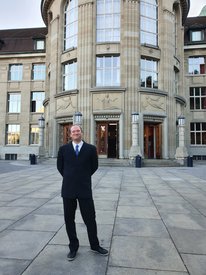Zürich, September 2022
Philipp Öffner
PD Dr. rer. nat.
I currently hold a position as an interim professor in numerical analysis at TU Clauthal. Prior to joining TU Clausthal, I worked as a postdoctoral researcher at the Johannes Gutenberg University Mainz, the University of Zurich and the Technical University of Brunswick.
My research primarily revolves around the examination and advancement of numerical techniques applicable to ordinary and partial differential equations, with a specific focus on hyperbolic conservation/balance laws. I dedicate my efforts to exploring stability characteristics, the maintenance of physical constraints, and the approximation and convergence properties of these methods. To support my theoretical findings, I consistently complement them with numerical simulations.
Research Interests
- Numerical Methods for Compressible Flows (Continuous and Discontinuous Galerkin, Residual Distribution, Flux Reconstruction, Finite Difference, Finite Volume, Global and Local Radial Basis Function Methods)
- Time Integration Schemes (Runge-Kutta, Deferred Correction, ADER, modified Patankar and GeCo schemes)
- Uncertainty Quantification
- Approximation Theory
- Computational Fluid Dynamics (CFD)
- Data-driven approaches combining analysis and data
- Scientific Machine Learning
- Scientific Computing
News:
-
Together with D. Kuzmin, H. Hajduk, and G. Lube, I have submitted a paper titled "Locally Energy-Stable Finite Element Schemes for Incompressible Flow Problems: Design and Analysis for Equal-Order Interpolations." The preprint is available at arXiv.
- The paper "On the robustness of high-order upwind summation-by-parts methods for nonlinear conservation laws" has been accepted in JCP (30.9.2025). The preprint can be found here.
- I gave a talk at the Lehrerfortbildung at the TU Clausthal about "Von der Theorie zur Praxis: Numerische Methoden und ihre Bedeutung in der mathematischen Biologie und Chemie" (19.9.2024). The slides and the material can be found here.
- With collaborations partners, we have submitted our article about "Generalized upwind summation-by-parts operators and their application to nodal discontinuous Galerkin methods". The preprint can be found on arXiv.
- My paper with Janina Bender on "Entropy-Conservative Discontinuous Galerkin Methods for the Shallow Water Equations with Uncertainty" has been finally published in
Communications on Applied Mathematics and Computation. It is open access and can be found here.
Contact and further informations
You can find further information on
